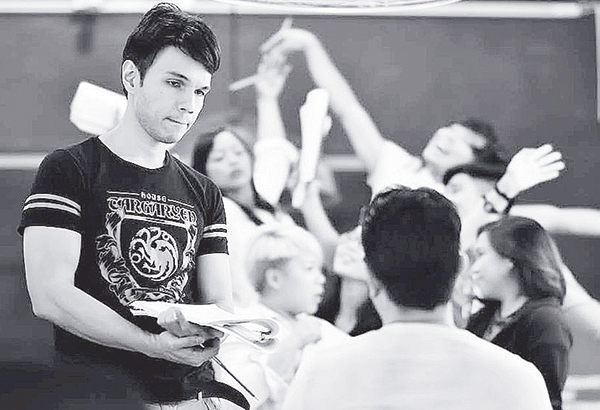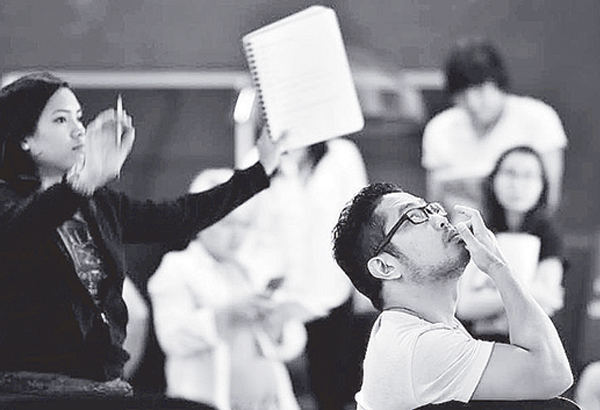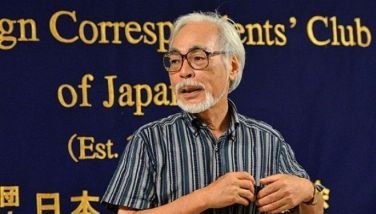Molière PMS offers Theater 101
MANILA, Philippines - How do you make Molière, a satirist-playwright who lived less than four centuries ago, fresh and exciting? In the current Molière PMS, George de Jesus III has worked on three of the French artist’s best works, fused them and set the new story in an imaginary Philippine theater scene, and conjures up local and world theater and acting greats in a show that runs for about an hour and 45 minutes.

The result is not only Theater 101, an introduction to the art and business of drama and acting, but also, true to the spirit of its originator, the most edifying, sharpest and funniest show in town.
The challenge to De Jesus, the writer and director of the work, is to make Molière alive and immediate to a contemporary Filipino audience. He believes that more than other great playwrights, Molière wrote the most Pinoy of comedies. Thus local audiences can relate to the plays more easily. Maybe not “more Pinoy than Shakespeare” but just as universal and timeless in content.

And so, you can see in the characters not only theater people but other ordinary folk as well. They can be impatient, grumpy and haughty, if also serious and committed, ignorant, pretentious, self-important, insincere, insensitive, amorous.
In his time, Molière beat to a pulp the aristocracy, the religious establishment and pompous, self-important officials, though he was careful not to antagonize the royalty, his benefactor, in particular the reigning king (he knew which hands not to bite).
De Jesus’ characters talk big — of concepts, pure theater, stylistic approaches to acting, compromise (such as getting a name actor to draw crowds), and inevitably drop the names of Ibsen, Chekov, Arthur Miller and Shakespeare, and acting gurus like Eric Morris and Stanislavski.
Ironically, Filipino actors mentioned are active not in theater but in film — Caridad Sanchez and Gina Pareño.
Sarcastic director and artists question the use of praises by critics (“napuri lang, critical rave na, baka blogger!” or something to that effect) and the mention of award in playbills, like the Aliw (their brows shooting up to the ceiling).
In telling Molière’s stories and the original fusion of his comedies, De Jesus uses no stage or platform, only the floor of what may be likened to a living room — at the center of a limited audience, no elaborate, frilly 17th century costumes (which would have been costly or difficult to make or rent) and no sets, only tarps of life-size portraits of Molière’s 17th-century characters into which the new play’s contemporary actors occasionally stick out their faces to “inhabit” the original French characters as needed (like playful standees at carnivals with holes just big enough for fun-seekers to fit their faces and pose for pictures).
Renante Bustamante as the choleric director Alex — he alternates with Tuxqs Rutaquio — is much like Molière’s willful, dyspeptic Argan in The Imaginary Invalid, and maybe like Molière himself. Alex’s opening and final scenes bookend the show; in the last, he collapses like Molière the actor-playwright, at the close of a performance. But as they would say, even hypochondriacs get sick — and succumb. When Alex’s body is taken away, the cast bursts into a musical number not so much a wink to Bollywood as a nod to Molière’s farces and ballets-comedies in which he included musical numbers in collaboration, first, with namesake Jean-Baptiste Lully (Molière’s real name was Jean-Baptiste Poquelin), then with Marc-Antoine Charpentier (in his last, La Malade Imaginaire).
If De Jesus’ tribute to Molière resonates, credit is primarily due to the cast as well as De Jesus. Angeli Bayani is the closest in the cast to being a celebrity. And though she once won the Gawad Urian over Vilma Santos, Nora Aunor, Cherie Gil and Agot Isidro, and is a star of the indie film and a regular in theater productions; no way may she draw a gasping, shrieking mob when she appears in public. Yet as ever, Angeli never disappoints as one of the play’s major characters; her effortless, naturalistic attack is a joy to watch.
The same may be said of her nine other co-actors (at the opening night), who have contributed equally to the success of the play. In this premiere night cast is RS Francisco (M or M. Butterfly, The Country Wife both staged at UP), the new story’s compromise star actor whose ego is written all over himself, figuratively and literally (in his tee).
The other members of the ensemble for the entire run of the play are Meann Espinosa, Paolo O’Hara, Ross Pesigan, Via Antonio, Randy Villarama, Martha Comia, Migs Almendras, Sky Abundo, Sari Estrada, Joel Saracho, Mara Paulina Marasigan and Mayen Estanero. Their roles and performances are both distinct and distinctive, and they deserve a salute for their dedication to craft, their talent and professionalism.
These actors are Moliere PMS’ greatest resources apart from the playwright-director. They embody the spirit of Moliere, and they are at turns irritating (in character), hilarious and awesome.
Finally, one need not be familiar with Molière to enjoy the show, though admittedly it helps in appreciating the biting comedy to the max. A “must” for all theatergoers and especially actors of whatever stripe — whether working on film and television, and stage.
(A production of the Egg Theater Company, the PARC Foundation and Pineapple Lab, Molière PMS was staged this past weekend in San Juan and will move to Pineapple Lab in Makati tonight, tomorrow [Oct. 8], Oct. 14 and Oct. 15 at 8 p.m., and Oct. 9 and 16 at 6 p.m.)
- Latest
- Trending




























 Exclusive
Exclusive